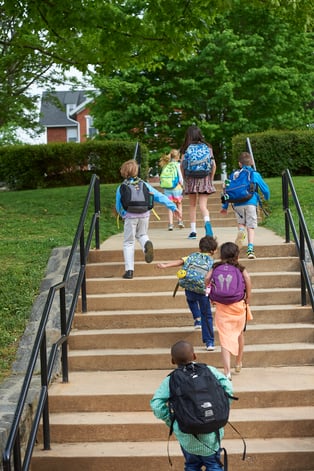 As we look toward fall and what we all hope will be a “more normal” start of school, there is a sense of excitement as well as a sense of concern. Many children have been home for a full year or more and on top of the normal start-of-school jitters and butterflies, they have the added weight of post-pandemic re-entry fears. We asked our psychology team here at Westtown to share some advice to help children of all ages prepare for school this fall.
As we look toward fall and what we all hope will be a “more normal” start of school, there is a sense of excitement as well as a sense of concern. Many children have been home for a full year or more and on top of the normal start-of-school jitters and butterflies, they have the added weight of post-pandemic re-entry fears. We asked our psychology team here at Westtown to share some advice to help children of all ages prepare for school this fall.
For young children:
- If possible, enroll your child in an organized summer activity such as camp, music lessons, or a swim team.
- Schedule play dates with children of the same age, both one-on-one and in groups.
- Go to your local playground, pool, or recreational center frequently to allow your child to adjust to settings with more people.
- Take your child into the community by going to stores, the zoo, the library, etc.
- Create jobs and routines around the house that can foster independence such as packing a bag, cleaning up toys, and taking care of simple chores around the house.
- As the summer comes to a close, be sure to talk to your child about what they should expect when they go back to school.
For children of all ages:
- Validate, support, and listen to your child. Listen to their concerns, understand their possible anxiety, and offer empathy. Engage in open dialogue
- Be honest and encouraging, rather than just offering reassurances (i.e., “Everything is going to be OK!”) which can start a cycle of empty reassurances. You can do this by acknowledging risks while emphasizing how precautions reduce risk. Be sure to let them know all of the thought and planning that has gone on to protect them.
- Encourage tolerance of uncertainty, and when they share a concern, engage them in problem-solving where they come up with their own solutions. This will empower them in the long run.
- Realize that no amount of planning will eliminate anxiety. Helping our children tolerate anxiety rather than avoiding it is key. Facing fears fosters resilience and reduces anxiety because you are teaching your child that they can cope.
- Praise your child when you notice that they are being brave while facing a difficult moment this summer. When you make note of their courage, it helps them build confidence, gives them a sense of being brave in their bodies, and prepares them to be brave in new situations.
Remember that our capacity to care for our children depends deeply on our ability to take care of ourselves as parents and to know our limits. Use this summer not only to prepare your child for the fall but also to care for your own physical, mental, and spiritual needs. You will be modeling this for your children and allow yourself to become an even better parent.



